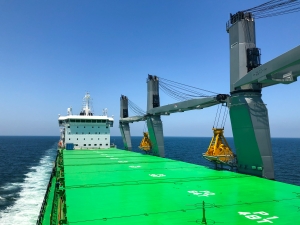


(Posted on 28/08/18)
The next-generation bulk carrier Haaga has been delivered to ESL Shipping from Jinling Shipyard in Nanjing, China. ESL Shipping is part of the Aspo Group. The 160-meter, 25,600 dwt, LNG-fueled vessel generates less than 50% of the carbon dioxide emissions of the previous generation of vessels. The vessel can also be fuelled by completely carbon-free biogas, once the availability of carbon-free biogas improves over time.
The vessel incorporates several innovative solutions to reduce its environmental footprint by minimizing its energy consumption and emissions. The shipping company and MacGregor, which is part of Cargotec, have developed the world's first autonomous cargo handling solution for the vessel to further improve safety and efficiency.
The vessel will have raw material cargo while arriving from Japan to the Baltic Sea, where the vessel is currently scheduled to arrive in mid-September.
"Our new vessels have met with an excellent reception among our customers. Every employee of our shipping company should be genuinely proud of what we have achieved during our newbuilding project", says Mikki Koskinen, Managing Director of ESL Shipping.
The completion of the new vessels will have a positive effect on the shipping company's profitability and competitiveness.
"This investment of around EUR 60 million is significant for a company of Aspo's size. It's also an excellent example of our responsible ownership, as environmental responsibility involves considering future generations, too. The design and construction of the new vessels were completed as planned. The vessels will considerably increase ESL Shipping's capacity, in addition to improving its profitability", says Aki Ojanen, CEO of Aspo Plc and Chairman of the Board of Directors of ESL Shipping.
This newbuilding project is part of the Bothnia Bulk project, partly funded by the EU. Its goal is to modernize the sea route between Luleå, Oxelösund and Raahe to be more eco-friendly. In addition, environmental emissions will decrease at port with the improved availability of shore-side electricity. The vessels have been designed by Deltamarin in Finland, and European equipment suppliers have provided roughly 60 percent of all vessel systems.
Columbia Group anticipates a period of strong expansion as an increasing number of international shipowners... Read more
Norse?Ship Management has expanded its use of Smart Ship Hub’s high frequency sensor data and... Read more
As the maritime industry gears up to welcome the IMO’s STCW bullying and harassment training amendments... Read more
NORDEN has acquired the cargo activities of Taylor Maritime in Southern Africa (previously operated... Read more
Philippos Ioulianou, Managing Director of EmissionLink, has warned the IMO’s decision to delay... Read more
VIKAND has highlighted the need for cultural change in the maritime sector as reports of bullying, harassment... Read more
The maritime industry is experiencing a period of significant transformation, driven by rapidly evolving... Read more
NorthStandard has advised Members of a 5% increase in P&I premiums for the marine insurance year... Read more
Anemoi Marine Technologies, the UK-based leading designer of Rotor Sails for wind-assisted ship propulsion... Read more
Helm Operations has announced that nine electronic record books within Helm CONNECT Logbook have been... Read more